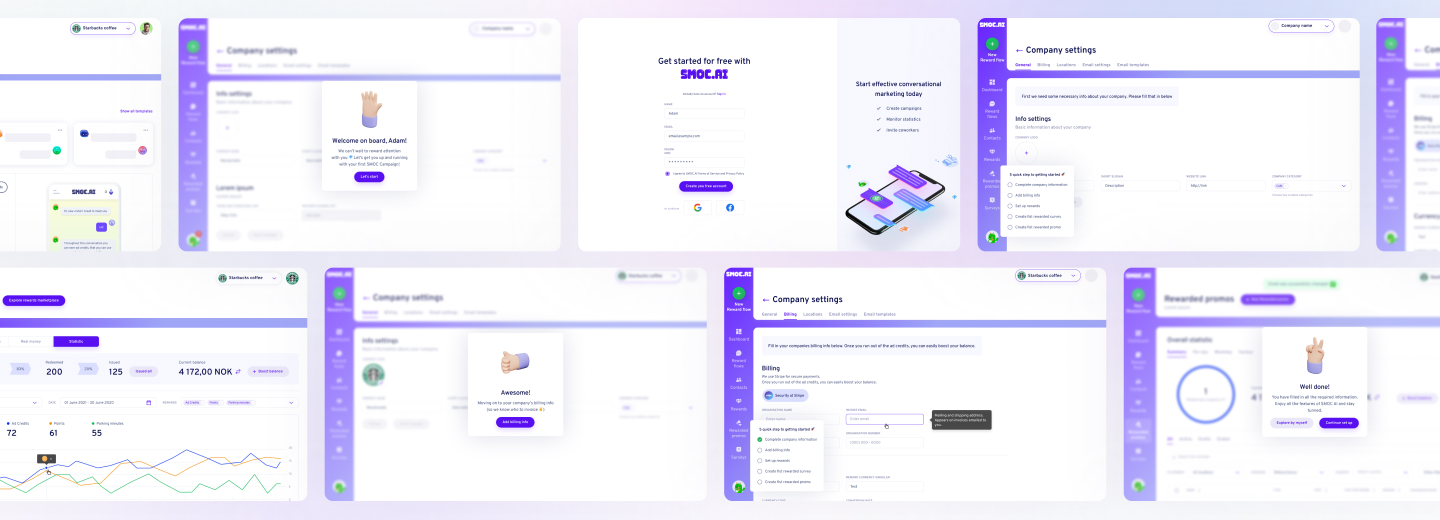Have you ever thought about the incredible potential that lies in startup app development projects? Picture a team brimming with enthusiasm, prepared to transform a digital vision into an influential application, only to stumble due to easily avoidable pitfalls.
By learning from these common mistakes in app development, inspired entrepreneurs can not only gain invaluable insights but also increase their chances of success exponentially.
what’s in the article
- Why Startup App Development Requires Careful Planning
- How to plan App Development for Startups
- Common Mistakes in Startup App Development
- How to Avoid Mistakes and Launch a Successful Startup App
- Conclusion
Why Startup App Development Requires Careful Planning
In startup app development, meticulous planning is key to turning conceptual ideas into digital solutions for their respective audience. When creativity, technology, and strategy converge in a coherent planning phase, startups can establish clear objectives, assess market demands, and recognize potential risks that might undermine app success. This allows outlining strategic decisions and identifies the technical resources and infrastructures essential for a successful launch and sustainable growth.
Furthermore, app development in a startup environment often requires a well-conceived plan that ensures adaptability and empowers nimble responses to changing conditions, enhancing the startup’s capacity to seize new opportunities.
Ultimately, strategic planning in startup app development projects ensures optimized resource allocation, comprehensive risk management, and streamlined development processes. This foundation enables the creation of innovative apps that can benefit both its owners and users.
How to plan App Development for Startups
A well-articulated plan defines clear objectives, target metrics, and potential constraints, that give vivid direction to all stakeholders. In-depth market analysis should become the basis of the plan and inform strategic planning to avoid startup app development mistakes.
Startups can create a strong roadmap by doing thorough research and working with stakeholders. This roadmap clearly outlines key milestones, timelines, and resources, ensuring everyone is on the same page and accountable, and enabling smooth execution. Using agile methods and focusing on user-centered design allows startups to adapt quickly to market changes and user needs while staying true to their core vision.

Looking to Build a Startup without worries about strategy planning?
EVNE Developers is a dedicated software development team with a product mindset.
We’ll be happy to help you turn your idea into life and successfully monetize it.
Common Mistakes in Startup App Development
In startup app development projects, a myriad of common missteps can derail success. As far as most mistakes arise due to founders’ inexperience, recognizing these pitfalls early allows startups to chart a smoother course, paving the way for growth.
Embracing a focused, agile strategy enables startups to adapt intelligently and respond to market needs with precision, with fewer chances of failing due to the numerous pitfalls described below.
Skipping Market Research
Market research starts successful startup app development projects, shedding light on user needs. Omitting this step can make startup app development mistakes appear before it even begin. Without understanding the preferences of a target audience, initial traction may be elusive. Skimping on market research inevitably impacts long-term growth potential and competitive edge. Regularly updating this information ensures your app remains relevant, adaptable, and prepared to embrace opportunities within the ever-evolving technological landscape.
Ignoring MVP Development
Neglecting Minimum Viable Product (MVP) development is a common pitfall in startup app development projects. By launching an MVP, startups can rapidly gather user feedback to guide improvements and reduce erroneous assumptions, ultimately saving time and resources. Choosing to overlook this phase could result in a resource-heavy app that fails to resonate with users. The MVP not only accelerates learning but also paves the way to aligning with user expectations, fostering a product-market fit.
Budget Management
Effective budget management remains a cornerstone of success in startup app development projects, where a strategic, systematic approach is needed to ensure sustainable, long-term growth. Successful entrepreneurs know that careful forecasting allows them to allocate resources judiciously.
Moreover, startups frequently battle with shifting priorities and unforeseen expenses, necessitating adaptive financial controls. Cost overruns lead to unforeseen distractions in startups, redirecting focus from innovation and product refinement, jeopardizing project timelines.
Wrong Technology Stack
Choosing the wrong technology stack can severely impact your startup app development projects, compromising potential and competitiveness. The key lies in meticulously analyzing how different technologies harmonize with the app’s specific feature set, ensuring a balance of scalability, flexibility, and economy to match stakeholder expectations.
A misstep can lead to an arduous rebuilding process or stifled growth. Therefore, resist the temptation to follow trends blindly and opt for “tried-and-true” without foresight. Seek technology that aligns with your project’s unique vision, developing synergy rather than unnecessary friction.
Poor UX/UI Design
Good UX/UI design makes it easy for users to accomplish what they want while also looking visually appealing. In startup app development, ignoring UX/UI can seriously hurt an app’s chances of success.
- Complex Navigation that confuses users and increases abandonment rates.
- Lack of Accessibility for users with disabilities, limiting your audience.
- Inconsistent Design Elements that disrupt intuitive user interaction.
- Slow Load Times stemming from heavy design elements bogging down performance.
Lack of Maintenance and Support
Many startup app development projects fail to prioritize consistent support post-launch. This oversight stifles an application’s potential for growth, as users quickly move to competitors offering a more seamless experience.
Proactive updating of your app – be it through regular bug fixes or adapting to new system requirements is an essential growth strategy. This ongoing process demands attention to detail, allowing your project to sustain itself long-term. Maintaining momentum guarantees user retention and leverages the advantages of a responsive, industry-leading approach.

Proving the Concept for FinTech Startup with a Smart Algorithm for Detecting Subscriptions

Scaling from Prototype into a User-Friendly and Conversational Marketing Platform
How to Avoid Mistakes and Launch a Successful Startup App
Successful startup app development demands strategic planning, iterative progress, and user focus. Strong teamwork, clear communication, and a solid roadmap are crucial for empowering development teams to deliver revolutionary solutions. Market research, agile methods, and user feedback are essential for long-term success.
Hire a Professional CTO
An adept Chief Technology Officer (CTO) is vital to the success of startup app development projects. Startup ventures with an experienced CTO surpassed complexities without losses in performance, delivering pioneering innovations, and establishing sustainable growth trajectories.
A professional CTO not only anchors the technical vision but also acts as a bridge between intricate technical demands and overarching business strategies. This synthesis ensures cohesive progress while adapting swiftly to evolving technological landscapes.
By investing in the expertise of a competent CTO, startups are not only cushioning themselves against the top three startup pitfalls—insufficient execution, poor scalability choices, and ineffective team communication—but also reinforcing foundations for robust technological innovation.
Optimize Performance
Optimizing performance in startup app development projects requires a strategic blend of foresight, innovation, and a meticulous focus on the nuances governing scalability and responsiveness. Efficient performance not only enhances user experience but can also set your app apart in a competitive marketplace while allowing to manage app development teams.
Leverage cutting-edge technologies such as cloud services, AI, and machine learning (all offering incredible optimization opportunities) for strategic advantage. Prioritizing these advanced technologies increases the app’s ability to handle user spikes efficiently, ensuring your infrastructure remains resilient.
Balancing speed and reliability will fundamentally elevate your app’s attractiveness, providing users with an undeniably polished and seamless experience that speaks volumes about your commitment to excellence.
Prioritize MVP Development
For startup app success, prioritizing a Minimum Viable Product is key. Rather than adding too many features initially, focus on core functionalities that support your startup’s vision. This MVP approach allows you to collect crucial user feedback early on, which can then be used to improve the app in future versions. Developing an MVP also helps to launch faster and reduce development costs due to particular focus on the most business-oriented functions. Early user feedback provides insights that can be methodically integrated into subsequent iterations, improving the app’s overall user experience.
Gather User Feedback
Prioritizing user feedback in startup app development projects is vital for crafting a product that resonates with its audience. Incorporating feedback helps refine app functionalities and align them with user expectations. Foster an environment where users feel valued and heard.
- Conduct Surveys: Create engaging surveys to collect targeted insights from potential users.
- Organize Focus Groups: Host discussions with potential users to delve deeper into their needs.
- Monitor Beta Testing Feedback: Encourage beta users to provide detailed feedback and report issues.
- Leverage Analytics Tools: Use analytics to understand user behavior and pinpoint areas for improvement.
- Engage on Social Media: Interact with users on platforms to gain spontaneous and unfiltered feedback.

Need to check what your product market is able to offer?
EVNE Developers is a dedicated software development team with a product mindset.
We’ll be happy to help you turn your idea into life and successfully monetize it.
Conclusion
Avoiding common mistakes in startup app development projects accelerates your journey toward groundbreaking innovation, elevating your startup to new heights of success. By wisely navigating the complexities of technology and user expectations, startups can promote efficiency, creativity, and fulfillment of the collective vision.
Indeed, the commitment to meticulous planning, agile mindset, and user-centric development serves as the bedrock for every startup striving to revolutionize the market. As you forge ahead, embrace the philosophy of continual learning and adaptation, recognizing that every challenge is an opportunity to excel. Seek collaboration, fortified by resilience, and endeavor to delight the users through avoiding mobile app development mistakes.
Many startups rush into development without a deep understanding of their target market. Startups, eager to be the next trendsetter, often skip this critical step, only to find themselves navigating a saturated or non-expressive market. It’s prudent to pause and delve into – not only the market but also the behavioural nuances of the end user – to refine the app’s offerings and establish a robust market-fit advantage.
Embarking on the journey of startup app development projects with a Minimum Viable Product offers profound strategic advantages, particularly in optimizing resource allocation and ensuring market alignment. An MVP allows startups to validate their concept with minimal investment, reducing financial risk. Developers can swiftly launch, accumulate user feedback, and iterate accordingly.
In most startup app development projects, a well-thought-out budget should encompass initial design, development, testing, and deployment phases, while leaving room for post-launch optimizations. Evaluations suggest that costs may fluctuate based on the complexity, features, and required platforms for the application. Importantly, having clear financial avenues allows for adaptive scalability as your app evolves.

About author
Roman Bondarenko is the CEO of EVNE Developers. He is an expert in software development and technological entrepreneurship and has 10+years of experience in digital transformation consulting in Healthcare, FinTech, Supply Chain and Logistics.
Author | CEO EVNE Developers


















